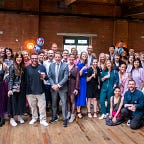Autonomous teams and serendipitous workplace
4 out of the 10 end states to aim for
The workplace of the future is already here. Right now, companies have an opportunity to reset the way they work. Leaders can reboot workplaces with a fresh focus on culture, purpose, diversity and empathy.
We’ve identified ten big themes that we’ve seen in the most successful organisations we’ve worked with, and we’re revealing them 2 at a time in a series of articles. Catch 1. and 2. here.
3. Autonomous teams who can make big things happen
We were working with a forward-thinking multinational company, talking them through a new innovation process, and in the middle of the chart was a box that read: “Empower an autonomous team.”
“This is great,” said the MD. “But how are we going to make sure they do the right thing?”
When teams feel empowered and autonomous, they’re self-organising and highly engaged. They don’t have a one-size-fits-all structure, and they work in different ways. They’re a gang. They develop skills they need as the business changes and grows. They collaborate effectively, make decisions quickly and the people in the team know exactly why they’re there.
It’s the holy grail. For old-school bosses it’s a nightmare — a team empowered to bend the rules. Giving teams and managers confidence to work this way can be a long journey, requiring them to trust themselves and each other.
It also means creating teams that can focus; small, dedicated teams can make big things happen. As Amazon’s Dave Limp says:
“The best way to fail at inventing something is by making it somebody’s part-time job.”
4. A serendipitous workplace
It’s the million dollar question: How do we not lose the watercooler moments — the spontaneous conversations and ideas that come from people being in a building together? Without the office as a central hub, these in-person moments at desks, in kitchens and walking to meetings are lost. Without care, hybrid working could mean that those who largely return to the office feel more personally connected and creatively fulfilled than those who mostly Work from Home or Work From Somewhere Else.
“Brainstorms and creative collaboration feel harder online. I miss being together with the team and bouncing ideas around. We don’t have a laugh as much as we did before.” Sara Rhodes, then Director of Events at News UK
Could long-term virtual set-ups even mean an eventual decline in new ideas?
Successful workplaces will be those that encourage unplanned conversations and connect people socially — without adding to screen fatigue. Lunchclub and Clubhouse are two startups trying to engineer serendipity. Lunchclub is ‘Zoom roulette’ at scale, offering AI-facilitated meetings with someone in another business who you’d never otherwise have met. Clubhouse’s live audio rooms allow you to stumble upon conversations you’d never otherwise have heard. It can be magic — but the price is your time and attention, especially if you spend more time kissing frogs than meeting the prince.
Take a look at article 1 — Hybrid working that really works and a shared company story that makes sense.
This is an excerpt from our latest book Now for the tricky bit; it’s all about building stronger, happier businesses with purpose. Click here to request your copy now!
Magnetic is a design and innovation company that helps design better futures. We’ve worked with global businesses to build capabilities, products, services and transform organisations. To find out more, get in touch: hello@wearemagnetic.com.
